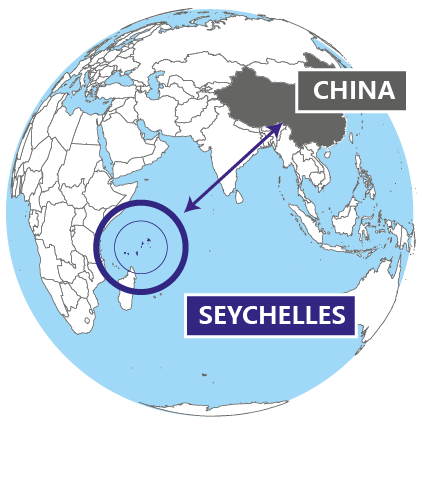Seychelles’ stellar economic performance, coupled with its environmental stewardship, has made it a global role model for sustainable development. Famous for its idyllic tourist attractions, the country marches to the beat of its own drum and has struck a harmonious balance between nature, culture and growth
Seychelles is something of a world of its own. Uninhabited by humans for most of recorded history, these tropical islands in the Indian Ocean provided the ideal conditions for the evolution of some of Earth’s most spectacular flora and fauna. It was not until 1502 that the islands were first positively identified by Portuguese sailors, one decade after Europeans landed on the shores of the Americas. The archipelago was subsequently visited by explorers, pirates and merchants on trade routes between Africa and Asia, but not settled until 1770 by French colonists.
After a brief period of independence from France, the British took control of the country in 1811. The British, following in the footsteps of the French, took advantage of the country’s natural abundance both at sea and on land. At the same time, thousands of freed slaves were rescued from Arab traders and resettled on the islands. Eventually, the country became a fully independent nation in 1976 and remains a true melting pot of cultures today.
“We have an incredible mixture of people from all over the world that came here and became a nation, developing our own unique creole culture. Because of these roots, we are very welcoming, as well as being well educated; many Seychellois speak three languages –English, French and Creole – or even more,” says Didier Dogley, the country’s minister of tourism, civil aviation, ports and marine.
And since independence, the development of Seychelles has continued to be extraordinary. Today Seychelles is the only African nation to be part of the World Bank’s “high-income” category. With an economy bolstered by world-class tourism, abundant fish, and a burgeoning financial sector, it has achieved “remarkable” economic performance over the last decade, according to the African Development Bank.
Seychelles is also singular in its commitment to the environment. The small nation is now one of the biggest voices in the international community around climate change and conservation. In 2016, Seychelles pioneered the first ever debt-swap deal for marine protection, setting aside 15 percent of its marine zone (30 percent by 2021) as protected areas. Likewise, it has set some of the world’s most ambitious targets for renewable energy and is in the process of installing Africa’s first utility-scale floating solar project.
Perhaps it is because of the country’s cosmopolitan culture, or maybe it’s inspiration from the calm blue seas, clean air and abundant wildlife, but this small island nation is clearly doing things right.
The Chinese have long been part of Seychelles’ melting pot of cultures, but recent years have seen cooperation between Seychelles and China reach new heights

Seychelles, a tropical island nation in the Indian Ocean with less than 100,000 people, may seem to have little in common with China, but the two nations have been close partners and allies for decades. Just one day after Seychelles’ independence in June 1976, the two countries established diplomatic ties and the countries’ increasingly global outlooks have led to intensified relations in recent years.
Even before Seychelles was independent, the Chinese have been leaving their mark on this multicultural country, whether it be in the cuisine, culture or the newly rebuilt pagoda in Victoria. The first Chinese arrived in Seychelles in 1863 and the community has blossomed ever since.
Throughout Seychelles’ modern history, the government of China has also been a key development partner.
“Be it in the health system, the education system, the building of our parliamentary house or judicial system, the Chinese government has been very faithful to the development of Seychelles,” said the country’s president, Danny Faure.
Over recent years especially, the countries have tightened ties both politically and culturally. Among several new developments, in 2013 the countries eliminated visa requirements for travel; in 2014 Seychelles launched the first annual Seychelles-China Day celebrations; and in 2016 the Seychelles Botanical Garden inaugurated a Guangzhou Garden as a symbol of cooperation with that Chinese region.
In 2016, Chinese President Xi Jinping also remarked on the strong relationship, saying that China attaches great importance to its relationship with Seychelles and pledging to work to push bilateral relations to new levels.